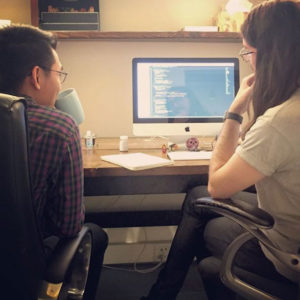May 11, 2018
Trying to start a new career is difficult and exhausting. There’s so much stacked against you. Companies are listing their Junior Developer positions with requirements of 3 – 5 years experience and an education (Still trying to figure out how this one works). You have no idea where to look and very little idea of what do when you stumble across an opportunity. I have so much sympathy and admiration for those of you looking for your first job in a new field.
Before we get any further, I need to say.
You. Can. Do. This.
It’s going to hurt, your likely going to have to deal with a little failure and rejection, but if you stay the course, you can be a web developer, designer, lion tamer or whatever else you want to be. Failure only exists when you pack it in, everything else is a lesson if you choose to see it that way.
What can you do help yourself out?
Here what I wish I knew when I was searching for my first job as a web developer.
1. Soft skills will never be replaced by robots
 One of your major disadvantages is that you have only the basic level of technical skills and have very little experience applying them. Maybe just enough to get you in the door. Here’s the thing, if the company that is hiring you is worth its salt, technical skills are, at most, half of what you are being interviewed for. Your interviewers are also trying to understand if you will elevate their culture.
One of your major disadvantages is that you have only the basic level of technical skills and have very little experience applying them. Maybe just enough to get you in the door. Here’s the thing, if the company that is hiring you is worth its salt, technical skills are, at most, half of what you are being interviewed for. Your interviewers are also trying to understand if you will elevate their culture.
Culture is built on soft skills and things that are extremely hard to teach. I can teach a junior developer to make smart decisions when creating a WordPress theme, but I can’t teach them values. I can’t teach them how to take criticism and I definitely can’t teach them why gossiping is far worse than a sloppy commit. A sloppy commit can damage a project, gossip can damage our whole company… across departments … it can actually make other team members worse if they engage with it.
There is research that shows that a toxic team member, when placed with the outstanding team members, actually brings the outstanding team members down instead of bringing the toxic team member up.
You’ve been practicing values (consciously or not) for your whole life. If you can show an interviewer that you can elevate and contribute to that companies purpose you’re going to see a lot more success.
2. Stop feeling defeated by the barren wasteland of craigslist
Craiglist should be your last resort when looking for a job as a developer. Everyone is already looking there, your emails are going to show your potential employer that you found them the same way 99% of the rest of the applicants did. It also says to your potential employer, I’m using my resume like a shotgun and hoping it hits something. Yes, you can send a well thought out message, but there are other, much better ways to find the right team.
The simplest, (and the one that requires the minimal effort) is to keep on top of a few blogs for shops you’d like to work for. They will likely give you clues to their culture and will be very impressed if you mention a few posts in your application. You likely be the first to see postings on the site, know the culture by the time they appear, and be ahead of the game.
Next, I’d recommend reaching out to a few key players on Twitter. One rule here, always tell the truth. Don’t pretend that you’re trying to become someone’s best friend if you’re looking for work. Sure, it would be great if you eventually became friends, but you’re looking for a job, mention that. Also helping someone out with some advice is less of a commitment than a new best friend.
Try a message that runs along the lines of “Hey, I’m So-&-So, and I looking for my first job as a web developer and would love some advice” over a false compliment like “I love your work, I’d love to discuss it over coffee and pick your brain”. The latter will crash and burn when the person learns you were just stroking their ego to ask for a job.
3. Keep learning (& creating) during your search.

If you only design, develop, write, etc. when you are in school (paying for it) or at work (being paid for it), you might want to question if you want to spend the majority of your waking hours doing it. I should be very clear though, this a balance, being a work-acholic is not good.
When you spend some of your time improving your craft and contributing to the culture that surrounds it, it will let teams know that you care about your work beyond your paycheque. It shows you are self-directed. It shows you value this type of and you are willing to work for it, and that you get genuine meaning and purpose out of doing the work.
If you are looking for resources, I’d suggest signing up for a Vancouver Public Library membership and using the free lynda.com account to get started.
4. Things are going to go sideways
Things are going to go wrong. You might get sick your first week. Buses might not be on time on your way to the interview. You could completely under or over-dress for the interview. Some of these will rock your boat, others might tip it all the way over, but know the waves are coming regardless. You can prepare for them. Heard that companies give tests during interviews? Go to a meetup and ask someone what theirs was like. Not sure how to dress? Check their Instagram and wear something just slightly a step up on the formality ladder to show you respect the opportunity.
The best analogy here is someone pushes you from behind, chances are you going to get knocked down, if they push you from the front, you can catch yourself. The world is going to try and push you, but I believe you are capable of staying afloat.
I mean you’re reading blogs about how to enter this amazing industry, you’re already headed in the right direction.